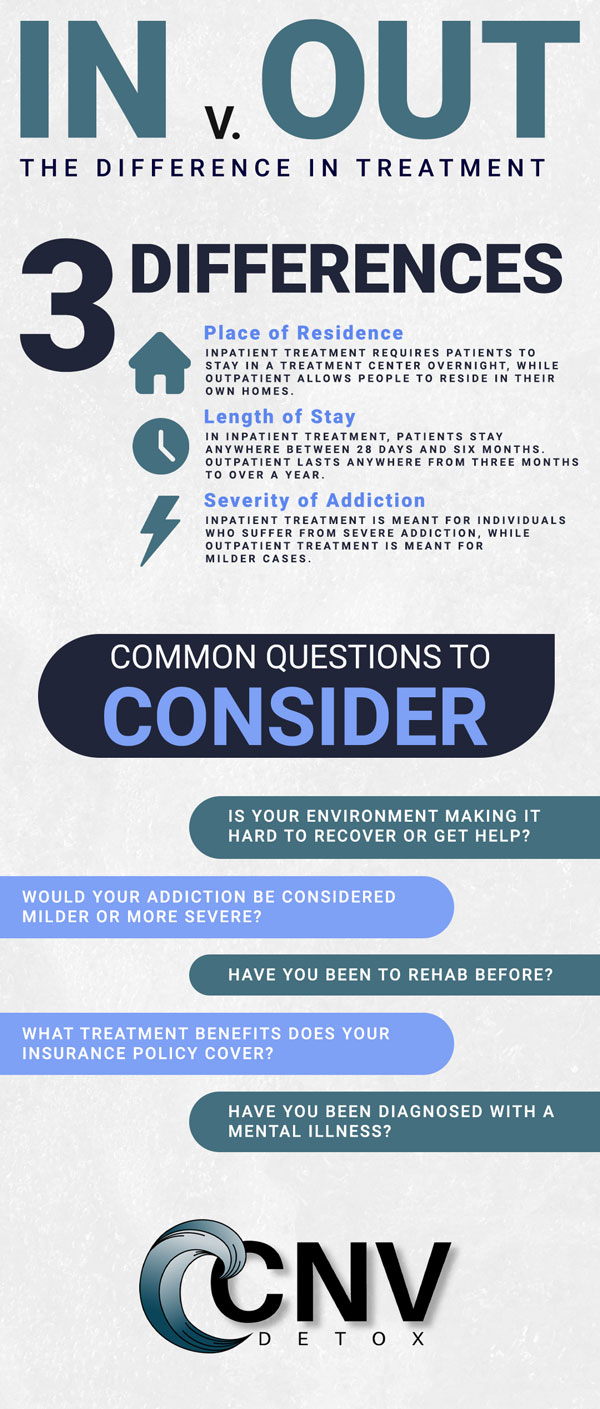Addiction to drugs or alcohol can be a challenge to overcome. Recovery involves attention to the physical, mental, and emotional components that lead to substance abuse. Thankfully, there are treatments available to help you or your loved one through the process. As you begin to search for the next step in your recovery journey, you will find that two of the main treatment models are inpatient treatment and outpatient drug rehab.

These treatment routines share much in common, and both inpatient and outpatient clients will receive counseling and therapy as support. However, several differences may make one type of treatment preferable to the other.
The Goal of Drug Rehab
There is more to recovery than stepping away from a drug habit. Relying on substances is often a sign of an underlying problem. If you do not deal with the mental and emotional issues in your life, you are much more likely to fall back into old habits.
Responsible treatment for drug and alcohol addiction looks at the whole person. Our goal is to help you get back on track for a fulfilling life. This focus means helping you make the necessary physical, social and psychological adjustments so that you can approach things in a new way. We want to free you from dependence on drugs so that you can enjoy life to the fullest.
Understanding the Continuum of Care
Recovery is a long-term process. Depending on the severity of an addiction, it can be years before cravings disappear. Even then, unexpected stress can trigger use.
Many treatment centers seek to provide a full continuum of care. In this model, addiction specialists see recovery as a slow transition from addiction to wholeness.
The continuum begins from the moment a client reaches out to seek help. There are several steps along the way:
- Evaluation – Determining the level of addiction and other client needs.
- Planning – Creating a treatment plan to meet those needs.
- Detox – Providing care as the substance leaves the client’s system.
- Treatment – Providing counseling and strategies for healthy living.
- Continued Support – Helping the client transition back into independent living.
Differences Between Inpatient Treatment and Outpatient Drug Rehab
With an understanding of the continuum of care, it’s clear that recovery takes time. However, every person and addiction is unique. Inpatient treatment and outpatient drug rehab can both help clients reach recovery, but they do so in different ways.
Location
The greatest difference between inpatient and outpatient care is the location. Both models may take place at a treatment center. In an inpatient setting, clients stay at the facility for an extended period. In most cases, they will not have contact with the outside world until they have made some progress. The treatment facility provides food, lodging and activities so that clients can focus their entire attention on getting better. In cases where the detox process requires medical observation, inpatient treatment is a necessity.
In outpatient drug rehab, clients spend most of their time outside the facility. They will come to counseling sessions a few days a week. In this scenario, clients can stay at home, continue working and support their families. The challenge for outpatient clients is that they never get to fully step away from their addiction triggers.
Intensity
When you’re at a treatment facility 24 hours a day, you live and breathe recovery. Inpatient rehab is an intense experience with continuous support. Clients do not only have access to the resources of experienced staff members. They also have the support and camaraderie of the other clients in the facility. It can be easier to go through the recovery process when you have other people walking with you.
Outpatient clients follow a different schedule. They will still receive counseling to deal with emotional issues and learn recovery strategies. However, after the sessions, they will go home. One of the strategies for successful outpatient recovery is developing a support system outside the facility.
Time
Due to its intensity, inpatient treatment can take less time than outpatient recovery. Some inpatient clients may be ready to return home after a month. Clients who need more support may live at a treatment center for three to six months. Outpatient clients can expect a longer process ranging anywhere from three months to a year.
Cost
The best inpatient treatment centers are comfortable facilities with resources for every aspect of a client’s recovery. In addition to therapy options, they provide healthy meals and opportunities for exercise. Living on-site for an extended period is more expensive than visiting for a few hours each week. Inpatient treatment will have a higher cost than an outpatient program.
Advantages of Inpatient Treatment

For many people struggling with addiction, recovery requires the full focus offered by an inpatient setting. The detox process can be uncomfortable and stressful. An inpatient center has the resources to assist clients through the ordeal. Also, the other clients in the facility provide a support group. These people can say that they are going through or have gone through the same thing.
Inpatient centers are also better equipped to handle the needs of dual diagnosis clients. An underlying mental health issue requires special attention. With residential care, the staff can provide better monitoring and support.
The inpatient setting also gives solace from the stressful triggers that cause a relapse. This time away is a retreat from daily concerns and stressful relationships. Clients have space and freedom to express themselves honestly, learn and grow.
Disadvantages of Inpatient Treatment
The realities of inpatient drug rehab are a challenge for some clients. It can be difficult for parents to spend that much time away from their children. Employers are often supportive of inpatient care, but it may mean lost wages or missed opportunities for the client.
The expense of an inpatient stay is another consideration. Before you enter a program, you will want to look at how much of the treatment your health insurance covers. If recovery becomes a financial burden, it can create another stressor.
Advantages of Outpatient Drug Rehab
The greatest advantage of outpatient drug rehab is that it is less disruptive than an inpatient program. Although clients may have to adjust their work schedules, they can remain active and engaged with their employer. Continuing to receive an income can make treatment more accessible.
These clients can also maintain their family lives with a minimum of interruption. The schedule of outpatient drug rehab means that there are fewer concerns about childcare schedules or missing out on special events.
Disadvantages of Outpatient Drug Rehab
The lack of disruption in an outpatient program can be a disadvantage. Continuing daily life means never getting from the pressures of that life. In addition, employers and family members may not respect the needs of an outpatient client. There can be pressure to skip sessions when they are inconvenient.
The length of time required by outpatient drug rehab can also be daunting. For some people, a large disruption for a month or two is easier to handle than a less intense process that lasts a year.

Part of the recovery process involves analyzing patterns and relationships. It is more difficult for clients to look at their lives objectively when they are in the middle of them. Spotting a harmful pattern is challenging without some distance.
Finding the Best Fit
The best choice between an inpatient and outpatient program depends on several factors. The treatment center may make a recommendation based on the type or length of the addiction. During the initial evaluation, they will also look at a client’s living situation and social needs.
The Ideal Candidate for Inpatient Treatment
Clients with a serious addiction or dual diagnosis do best in an inpatient setting. These individuals require separation from their daily patterns and stresses. The inpatient model gives them the support they need to recover and renew.
The Best Fit for Outpatient Drug Rehab
Outpatient addiction programs are best suited for clients with minor addictions. These are people who recognize that they have a problem, but it has not seriously impacted their lives. A person in recovery who has experienced a minor relapse can also find help through an outpatient program.
A client’s life circumstances may also make an outpatient model more realistic. People with small children and other caregivers may need the flexibility this type of treatment provides.
Finding Support on Your Recovery Journey
Whatever your recovery needs, contacting a treatment center is often the first step on the path. In Southern California, CNV Detox provides comprehensive, compassionate care for clients seeking relief from addiction. Our experienced team is ready to help you on the journey. Contact us today.





